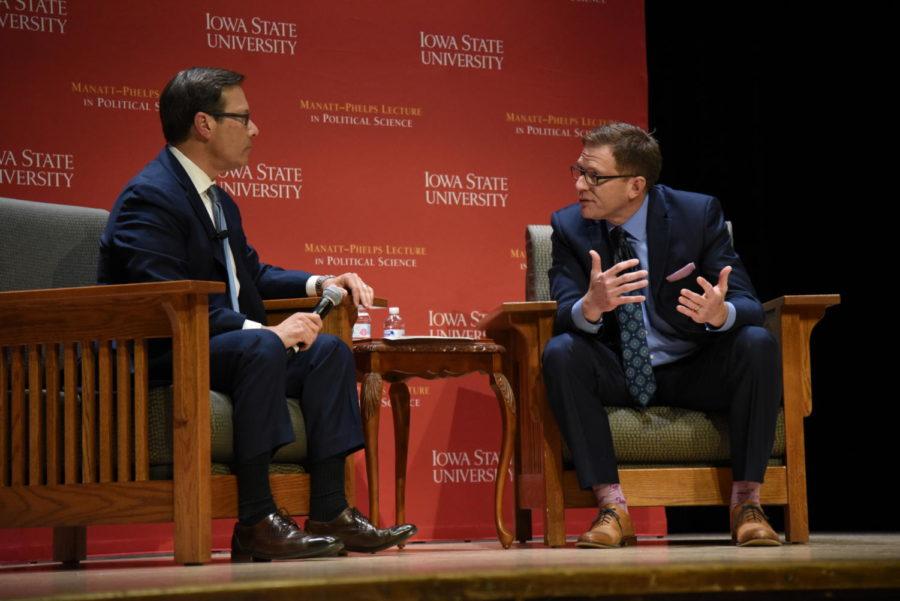Former FBI official talks security in today’s world
Caitlin Yamada/ Iowa State Daily
Frank Figliuzzi, former assistant director for counterintelligence for the FBI, speaks on Nov. 19 in the Great Hall of the Memorial Union. Figliuzzi spoke about security and a variety of threats facing citizens, such as information breaches and mass shootings.
November 19, 2019
Former FBI assistant director of counterintelligence and current NBC News security analyst Frank Figliuzzi presented the 2019 Manatt-Phelps Lecture in Political Science “Seeking Security in an Unstable World” Tuesday night in the Great Hall of the Memorial Union.
Martha Broadnax, senior in political science, introduced the speaker and the moderator for the evening, Dave Price, the political director of WHO-TV and host of “The Insiders.”
Price began by asking Figliuzzi about the lecture’s “ominous” title.
Figliuzzi first defined the meanings of security and stability, then went on to discuss if the fears of instability in today’s world are found to be valid.
Figliuzzi discussed several indicators he said demonstrated the reality of a less stable and secure world.
“First, we’re seeing nations decide to do things unilaterally,” Figliuzzi said. “Nations that would be our allies, that would have our backs, are doing things very transactionally. […] We’re seeing a rise around the world in nationalism. Now, we tend to think it all starts here in America — it’s all about us. But I’m here to tell you, the rise in nationalism, is not unique to America at all. We’re seeing it […] globally.”
Figliuzzi discussed several other indicators of insecurity, such as a rise in anxiety related to school shootings, increasing theft of intellectual property, the lack of ability to trust in social media and others.
On terrorism, Figliuzzi said the Internet allows for much faster radicalization than ever before, since young people can gather information and watch videos from their home.
Figliuzzi also talked about the impacts this lack of stability in university settings and in personal lives. From declines in international student applications due to fear of living in the U.S., to breaches of data in credit card companies and hotels, everyone is affected by the current political and social state of turmoil the world is in.
The lecture ended on a positive note with Price asking Figliuzzi what citizens could do to help improve these situations.
“I do remain optimistic, and here’s why: I think it’s human nature to look at all this and say the time that we live in right now […] is uniquely negative, it’s the worst ever,” Figliuzzi said. “[…] I remind those people, this country has survived a civil war, presidential assassination, presidential resignation, impeachment of president, the Vietnam War, Civil Rights era riots and protests, […] we lived through it all and we survived.”
Figliuzzi said people could call and write their local, county, state and federal officials to to ask to ensure they have paper backup for ballots in elections. Touchscreen voting can be easily compromised, and Russians have already messed with voting systems in several states, Figliuzzi said.
During an afternoon Q&A session, Figliuzzi also gave advice to students interested in an FBI career. He talked about his diverse experiences and jobs within the FBI and the honors internship that hooked him on working for the bureau. He worked under former FBI director Robert Mueller for much of his career.
Students asked questions ranging from inquiring about specific career paths to the FBI, his views on terrorism and national security and what his favorite FBI-focused show is. He said it is “Mindhunter.” One student asked Figliuzzi if he felt he was more ethical and unbiased due to his work with the FBI.
“Our values as a society are wrapped up in our institutions,” Figliuzzi said. “[…] Politicians come and go, and presidents come and go. But what remains, and where I think our values are wrapped up, is in our institutions. So, what you’re seeing in the impeachment hearings are career professional after career professional come out and say ‘I saw this as wrong, and I’m speaking out about it.’ Now, does that mean I can be unbiased? I try really hard, but when I see something as wrong, I have a hard time pretending it’s not.”







